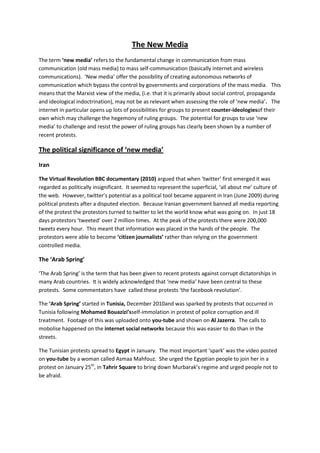
SociologyExchange.co.uk Shared Resource
- 1. The New Media The term ‘new media’ refers to the fundamental change in communication from mass communication (old mass media) to mass self-communication (basically internet and wireless communications). ‘New media’ offer the possibility of creating autonomous networks of communication which bypass the control by governments and corporations of the mass media. This means that the Marxist view of the media, (i.e. that it is primarily about social control, propaganda and ideological indoctrination), may not be as relevant when assessing the role of ‘new media’. The internet in particular opens up lots of possibilities for groups to present counter-ideologiesof their own which may challenge the hegemony of ruling groups. The potential for groups to use ‘new media’ to challenge and resist the power of ruling groups has clearly been shown by a number of recent protests. The political significance of ‘new media’ Iran The Virtual Revolution BBC documentary (2010) argued that when ‘twitter’ first emerged it was regarded as politically insignificant. It seemed to represent the superficial, ‘all about me’ culture of the web. However, twitter’s potential as a political tool became apparent in Iran (June 2009) during political protests after a disputed election. Because Iranian government banned all media reporting of the protest the protestors turned to twitter to let the world know what was going on. In just 18 days protestors ‘tweeted’ over 2 million times. At the peak of the protests there were 200,000 tweets every hour. This meant that information was placed in the hands of the people. The protestors were able to become ‘citizen journalists’ rather than relying on the government controlled media. The ‘Arab Spring’ ‘The Arab Spring’ is the term that has been given to recent protests against corrupt dictatorships in many Arab countries. It is widely acknowledged that ‘new media’ have been central to these protests. Some commentators have called these protests ‘the facebook revolution’. The ‘Arab Spring’ started in Tunisia, December 2010and was sparked by protests that occurred in Tunisia following Mohamed Bouazizi’sself-immolation in protest of police corruption and ill treatment. Footage of this was uploaded onto you-tube and shown on Al Jazerra. The calls to mobolise happened on the internet social networks because this was easier to do than in the streets. The Tunisian protests spread to Egypt in January. The most important ‘spark’ was the video posted on you-tube by a woman called Asmaa Mahfouz. She urged the Egyptian people to join her in a protest on January 25th, in Tahrir Square to bring down Murbarak’s regime and urged people not to be afraid.
- 2. ‘Los Indignados’ The ‘Indignados movement’ started as a direct critique of the political system in Spain and Europe as a whole and was inspired by the tactics of the Arab Spring. It was started by a small group in Madrid called ‘Real democracy now’ that started to organise some debates and demonstrations on the coming local elections. The call to protest went out over the internet and with no formal organisation tens ofthousands of people took to the streets in major cities all over Spain on May 15th. ‘Occupy Wall Street’ The Occupy movement t started with a call by the Vancouver based journal Adbustersto protest against thedirect connection between Wall Street and Politics by occupying Wall Street on September 17th. It was largely ignored until a protestor uploaded footage of the police spraying pepper spray into the eyes of a protestor on the internet. This clip went viral and helped to promote the movement in the USA and other parts of the world. The internet helped this movement to spread to many other cities and countries during the autumn of 2011, including the camp outside St. Pauls Cathedral in London. The use of ‘new media’ in these protests In his new book ‘Why It’s Kicking Off Everywhere’ (2012) Paul Mason analyses the full suite of new technologies used by these movements. It goes like this: “Facebook is used to form groups. Twitter is used for real-time organisation and news dissemination, bypassing the cumbersome newsgathering operations of the mainstream media. YouTube and the Twitter-linked photographic sites – Yfrog, Flickr and Twitpic – are used to provide instant evidence of the claims being made. Link shorteners such as bit.ly are used to disseminate key articles via Twitter”. Mason argues that because of these new technologies “truth can now travel faster than lies,and all propaganda becomes instantly flammable.” Mason also argues that underpinning the social media is mobile telephony: “In the crush of every crowd we see arms holding mobile phones in the air, like small flocks of ostriches, snapping scenes of repression or revolt, offering instant and indelible image-capture to a global audience” Manuel Castellsalsoargues that the use of the internet and mobile phones are essential to these movements as everybody has the potential to be a citizen journalist.Castells also notes that new technologies mean that protest movements in different parts of the world become more interconnected. For example the occupy movement had spread to 2,700 protests in different parts of the world by November 2011. So if you "follow" somebody from the London occupation on Twitter you can easily run into a radical blogger from Egypt, or a lecturer in peaceful resistance in California who mainly does work on Burma so then there are the Burmese tweets to follow.